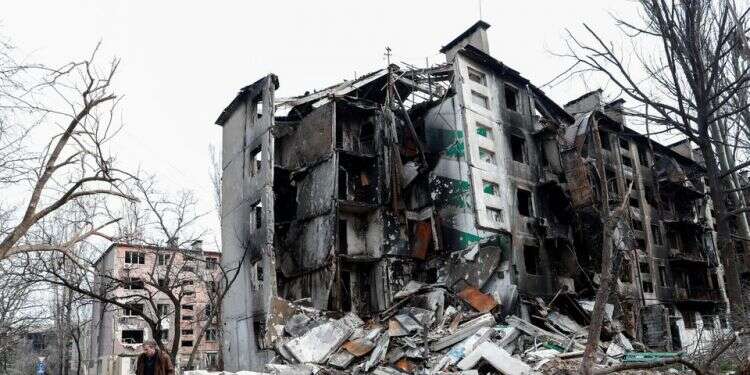The potential for foreign real estate investment in Israel, new technologies in the construction sector, and the day after the Russia-Ukraine war were just some of the topics on the agenda at a first-of-its-kind international conference that took place this week in Israel.
Follow Israel Hayom on Facebook, Twitter, and Instagram
The event brought together representatives of the Confederation of International Contractors' Associations (CICA) and senior real estate figures in Israel to examine possible collaboration and perhaps investments in Israeli technology, and, of course, Israeli real estate.
During the conference, the visitors viewed presentations by Israeli high-tech companies working in the framework of the joint technology initiative between the Israel Builders Association, the Ministry of Construction and Housing, the Ministry of Economy and Industry, and ConTech, a construction technology hub. Among the companies participating in the event were Veev, which has raised 400 million shekels, and a group of startups that have developed construction technologies, including a system to manage electricity and lighting, a system for pricing construction costs, tools for rapid construction, safety tools and alternative energy solutions.
During the event, the participants discussed the potential for foreign investment in Israeli real estate. Even though the construction industry in Israel is different from that in the West, it enjoys enormous demand for real estate assets. This enormous potential is now being understood by foreign investors. who are interested in urban renewal projects such as Tama 38 and Pinui binui projects.
Tama 38, or National Outline Plan 38, is the national outline plan for the seismic strengthening of existing buildings. Pinui binui ("evacuation and reconstruction") is a process that permits the replacement of old housing complexes and their outdated infrastructures with modern and innovative infrastructures as part of urban rejuvenation.
According to President of the Israel Builders Association Raul Sarugo, "All our guests from overseas are interested in investing in Israeli real estate in all segments of the industry: income yielding real estate, commercial, logistical centers, residential hotels, and assisted living facilities. There was a group from Uruguay that showed interest in investing in Tama 38 projects in Herzliya.
During the conference, the participants also discussed the effects of the Russia-Ukraine war, both current and in the future, on the real estate industry.
"The war will end at some time," said Sarugo, "and Ukraine will have to be rebuilt. It will be a global challenge and there is no doubt that the Israel Builders Association will be actively involved in the rehabilitation of Ukraine, through technological and logistical means, and with the recycling of materials. The destruction is enormous and as a result, there are huge amounts of rubble. They will need Israeli companies who know how to separate materials and recycle them for use as building materials."
"We have two major problems," explains Irwin Perret, the president of CICA, tells Israel Hayom Real Estate. "The increasing costs of raw materials as a result of the coronavirus pandemic and the Russia-Ukraine war. Many raw materials used to come from Russia, and for the foreseeable future, they will not come from there anymore. So this will impact and increase prices drastically.
"Even if new players enter the market, building costs will not return to the levels they were two years ago. Inflation is higher in the construction industry and has reached levels of about 40% for raw materials. The solution is, among other things, in construction technologies that will enable less intensive use of labor and raw materials. These technologies are more cost-efficient and faster, and for the most part, reduce costs."
Moshe Perets, chairman of the Foundation for the Encouragement and Development of the Construction Industry in Israel said during the conference: "Given that the industry currently employs some 300,000 Israeli workers, foreign workers, and Palestinians, then every event, no matter what, has an immediate effect on the industry and the financial markets and is included in home prices. We must invest in technologies that will be able to assist in any crisis in the future and reduce dependence on manpower.
The Foundation for the Encouragement and Development of the Construction Industry has a goal of promoting safe construction in Israel and will continue to examine solutions, including technological solutions.
Subscribe to Israel Hayom's daily newsletter and never miss our top stories!
The event hosting CICA was the first of its kind in Israel and points to the growing overseas ties formed by the Israel Builders Association.
The Confederation of International Contractors' Associations was established in 1974 in Tokyo, but today it is headquartered in Paris. CICA represents the construction industry around the world and it brings together continental federations of contractors' associations: The European Construction Industry Federation (FIEC) and the Inter-American Construction Federation (FIIC). CICA members include national organizations from various regions, such as the Overseas Construction Association of Japan (OCAJI) and the Israel Builders' Association, and it represents and speaks for the global construction industry on matters on its agenda.
This article might include sponsored and commercial content/marketing information. Israel Hayom is not responsible for its nature or its credibility. The publication of such content or information shall not be considered a recommendation and/or an offer by Israel Hayom to purchase and/or use the services or products mentioned in this article.




